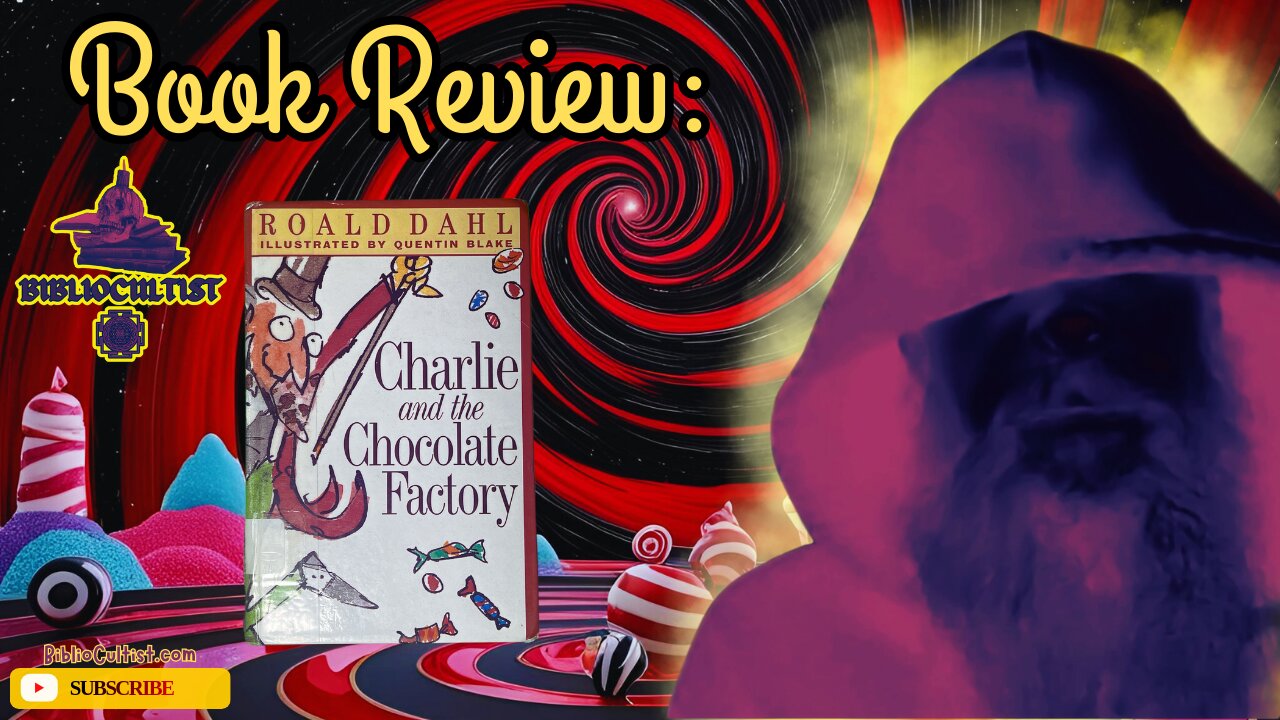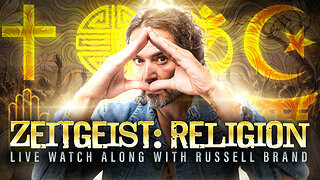Premium Only Content

Charlie and the Chocolate Factory: The Esoteric Alchemy of Willy Wonka's World
*CHECK OUT MY MERCH: https://bibliocultist.printful.me/*
In this spoiler-free #bookreview and #bookrecommendation, I delve into the deeper symbolism and esoteric themes explored in Roald Dahl's beloved novel 'Charlie and the Chocolate Factory'. Unlike the whimsical film adaptations, the book presents Willy Wonka as a mystical alchemist figure, with the golden tickets serving as gateways into his confectionary realm - a metaphysical paradise akin to heaven itself. The Oompa Loompas act as a Greek chorus, delivering scathing moral critiques of the deadly sins embodied by the gluttonous, greedy, prideful and slothful children through their aggressive musical numbers. Dahl's tale transcends a mere children's story, delving into esoteric concepts of class consciousness, morality and spiritual transcendence that are largely obscured in the more visually-oriented cinematic versions.
*all music and content copyright BiblioCultist.com*
#booktube #books #RoaldDahl #CharlieAndTheChocolateFactory #WillyWonka #alchemy #esotericism #OompaLoompas #Greekchorus #sevdeadlysins #gluttony #greed #pride #sloth #spirituality #transcendence #biblio #cultist
**SHOW NOTES**
1. Roald Dahl was a British author famous for his whimsical and darkly imaginative children's books like Charlie and the Chocolate Factory and Matilda. Born in Wales to Norwegian parents, he had a difficult childhood and later became a WWII fighter pilot, which influenced his storytelling. Known for blending humor, magic, and mischief, his works often carried moral lessons and a touch of the macabre. Despite personal controversies, Dahl's creativity and unique voice made him one of the most beloved authors of all time.
2. The first film adaptation of Roald Dahl's *Charlie and the Chocolate Factory* was released in 1971 under the title *Willy Wonka & the Chocolate Factory*, starring Gene Wilder as the eccentric candy maker. While Dahl wrote the original book, he reportedly disliked the film, feeling it deviated too much from his story and vision, particularly due to changes like the added musical numbers and a more sentimental ending. Despite this, the movie became a cult classic, with Wilder's quirky performance as Wonka earning widespread acclaim over time.
3. Hassan-i Sabbah was a Persian mystic, scholar, and the founder of the Nizari Ismaili state in the late 11th century. Known as the "Old Man of the Mountain," he established his stronghold at the fortress of Alamut in Persia, from where he led the secretive sect known as the Assassins. Renowned for their targeted killings of political and military leaders, the group struck fear into their enemies during a turbulent era of medieval history. Legends claim Hassan manipulated his followers with illusions, promises of paradise, and drugs like hashish, though these tales are likely exaggerated. A brilliant strategist and enigmatic figure, his legacy remains shrouded in myth and intrigue, symbolizing both rebellion and mystery.
4. The Greek chorus was a literary device used in ancient Greek drama, where a group of performers provided commentary on the unfolding events, offering background information, moral judgments, and reflections on the themes of the play. Acting as a collective voice, the chorus connected the audience to the deeper meaning of the story, often highlighting societal values, philosophical questions, or emotional undertones. This technique allowed viewers to interpret the actions of characters through a broader cultural or ethical lens, serving both an explanatory and evaluative role in the narrative.
5. Cultural imperialism, in its modern form, can be seen as the legacy of entitled generations descended from historical imperialists, who now impose their values under the guise of progressivism. This phenomenon is marked by a hypocritical demand for global conformity to liberal, socially progressive ideals, often dismissing or erasing millennia-old traditions and cultures that don’t align with their worldview. While their ancestors plundered resources and committed genocide with weapons and disease, today’s cultural imperialists wield the internet, NGOs, and media to reshape the world into a suburban reflection of their own beliefs, branding resistance as backward or evil. This new wave of imposition is arguably more insidious, as it cloaks itself in moral superiority while undermining cultural diversity and self-determination.
-
 28:36
28:36
Afshin Rattansi's Going Underground
1 day agoDoug Bandow: ENORMOUS DAMAGE Done to US’ Reputation Over Gaza, Trump ‘Easily Manipulated’ by Israel
4.43K19 -
 2:45:13
2:45:13
Barry Cunningham
9 hours agoCBS CAUGHT AGAIN! CHICAGO A MESS! LISA COOK IS COOKED AND MORE LABOR DAY NEWS!
64.1K27 -
 LIVE
LIVE
StevieTLIVE
3 hours agoMASSIVE Warzone Wins on Labor Day w/ Spartakus
168 watching -
 LIVE
LIVE
Rallied
9 hours ago $10.74 earnedWarzone Challenges w/ Doc & Bob
3,023 watching -
 LIVE
LIVE
Joe Donuts Live
2 hours ago🟢 Lost in Space with My Clones: The Alters Adventure Begins
91 watching -
 7:20:22
7:20:22
Dr Disrespect
11 hours ago🔴LIVE - DR DISRESPECT - TRIPLE THREAT CHALLENGE - WINNING AT EVERYTHING
188K12 -
 2:35:33
2:35:33
Chrono
3 hours agoBirthday-eve Stream | Helldivers II
7.02K -
 54:40
54:40
BonginoReport
1 day agoLABOR DAY SPECIAL! The Best of Nightly Scroll - Nightly Scroll w/ Hayley Caronia (Ep.124)
93.5K13 -
 LIVE
LIVE
Joker Effect
1 hour agoReviewing the downfall of Kick Streaming. Kick streamers welcome to Rumble! Stake bombshell found!
508 watching -
 1:06:10
1:06:10
Russell Brand
11 hours agoThe Greatest Lie Ever Told? - SF625
78.8K102